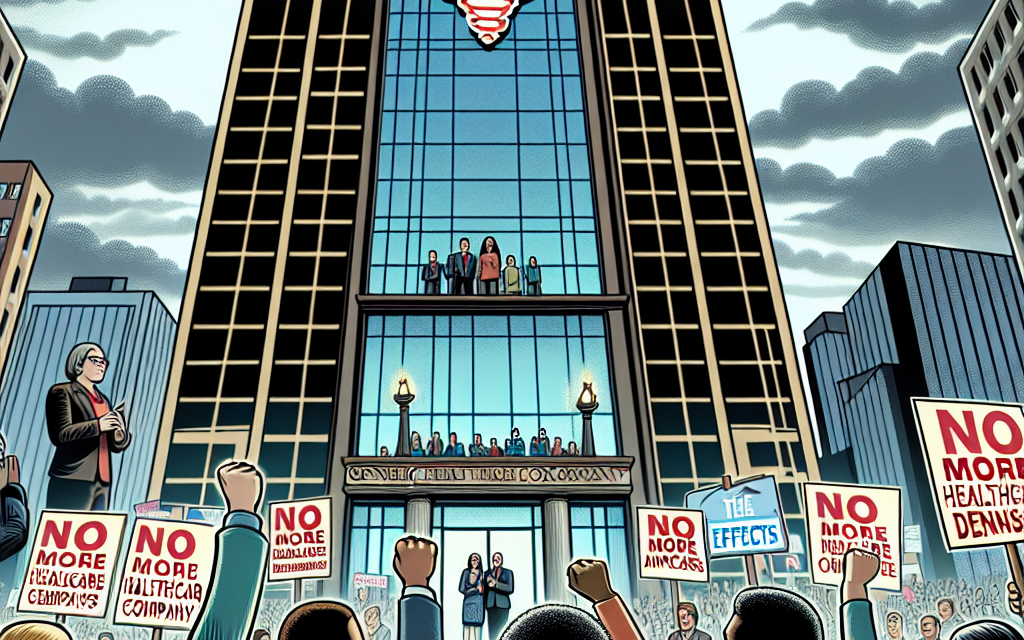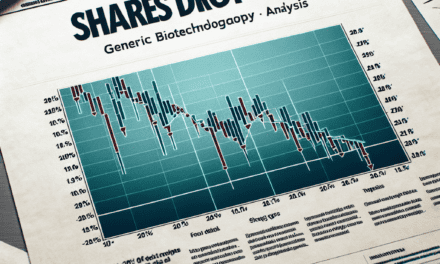“UnitedHealth Under Scrutiny: Shareholders Demand Transparency on Healthcare Denials Impact.”
Introduction
UnitedHealth Group is currently facing increasing pressure from shareholders to evaluate the implications of its healthcare denial practices. As one of the largest health insurance providers in the United States, the company has been scrutinized for its policies regarding claims denials, which some argue can negatively impact patient care and overall health outcomes. Shareholders are concerned that these practices may not only affect the company’s reputation but also its long-term financial performance. As the healthcare landscape evolves, stakeholders are calling for greater transparency and accountability in how UnitedHealth manages claims and patient access to necessary medical services. This growing demand for assessment reflects broader trends in the industry, where ethical considerations and patient-centric approaches are becoming paramount.
UnitedHealth’s Shareholder Concerns Over Healthcare Denials
UnitedHealth Group, one of the largest healthcare companies in the United States, is currently facing mounting pressure from its shareholders regarding the implications of its healthcare denial practices. As the company continues to navigate the complexities of the healthcare landscape, shareholders are increasingly concerned about the potential financial and reputational risks associated with denying claims for medical services. This scrutiny comes at a time when the healthcare industry is under heightened examination, with stakeholders advocating for greater transparency and accountability in the decision-making processes that affect patient care.
The crux of the issue lies in the balance between cost management and patient access to necessary medical services. Shareholders are urging UnitedHealth to conduct a thorough assessment of how its denial practices impact not only the company’s bottom line but also the health outcomes of its members. This call for evaluation is particularly pertinent given the growing body of evidence suggesting that excessive claim denials can lead to delayed treatments, increased health complications, and ultimately higher costs for both patients and the healthcare system as a whole. As such, shareholders are advocating for a more nuanced approach that prioritizes patient care while still maintaining fiscal responsibility.
Moreover, the increasing prevalence of healthcare denials has sparked a broader conversation about the ethical implications of such practices. Stakeholders are questioning whether the current model, which often prioritizes profit margins over patient welfare, is sustainable in the long run. This concern is compounded by the fact that negative patient experiences can lead to a loss of trust in the healthcare system, which may ultimately affect UnitedHealth’s market position and profitability. In light of these factors, shareholders are calling for a reevaluation of the company’s policies and practices to ensure that they align with both ethical standards and business objectives.
In response to these shareholder concerns, UnitedHealth has indicated a willingness to engage in dialogue and explore potential reforms. The company recognizes that addressing these issues is not only crucial for maintaining shareholder confidence but also essential for fostering a positive relationship with its members. By taking proactive steps to assess and potentially revise its denial practices, UnitedHealth can demonstrate its commitment to patient-centered care while also mitigating risks associated with public backlash and regulatory scrutiny.
Furthermore, the ongoing discussions surrounding healthcare denials are reflective of a larger trend within the industry, where companies are increasingly held accountable for their impact on patient health outcomes. As healthcare becomes more consumer-driven, organizations like UnitedHealth must adapt to the changing expectations of both patients and investors. This shift necessitates a reevaluation of traditional practices and a commitment to transparency, which can ultimately enhance the company’s reputation and strengthen its competitive position in the market.
In conclusion, the pressure from shareholders for UnitedHealth to assess the effects of its healthcare denial practices underscores a critical juncture in the company’s operations. By prioritizing patient care and addressing the ethical implications of its policies, UnitedHealth has the opportunity to not only satisfy shareholder demands but also to lead the way in transforming the healthcare industry. As the company navigates these challenges, it will be essential for it to strike a balance between financial performance and the well-being of its members, ensuring that it remains a trusted provider in an increasingly complex healthcare environment.
The Impact of Healthcare Denials on UnitedHealth’s Reputation
UnitedHealth, one of the largest healthcare companies in the United States, is currently facing increasing pressure from shareholders to evaluate the implications of its healthcare denial practices. As the company navigates the complex landscape of healthcare provision, the impact of these denials on its reputation has become a focal point of concern. Shareholders are increasingly aware that the decisions made by UnitedHealth regarding claims and coverage can significantly influence public perception and, consequently, the company’s long-term viability.
Healthcare denials, which occur when insurance claims are rejected, can lead to a cascade of negative outcomes for both patients and providers. For patients, these denials often result in delayed or denied access to necessary medical services, which can exacerbate health conditions and lead to increased financial burdens. As patients share their experiences, often through social media and online reviews, the narrative surrounding UnitedHealth’s practices can quickly shift from one of trust to one of skepticism. This shift not only affects individual patients but also has broader implications for the company’s brand image.
Moreover, the healthcare industry is increasingly scrutinized by regulatory bodies and consumer advocacy groups. As these organizations highlight the consequences of healthcare denials, UnitedHealth’s reputation may suffer further damage. The potential for negative media coverage amplifies this risk, as stories of patients facing hardships due to denied claims can attract significant public attention. Consequently, shareholders are concerned that a tarnished reputation could lead to decreased customer loyalty and, ultimately, a decline in market share.
In addition to the immediate effects on patient care and public perception, the long-term financial implications of healthcare denials cannot be overlooked. A company that is perceived as denying necessary care may face increased regulatory scrutiny, which can lead to costly legal battles and fines. Furthermore, if patients choose to switch to competitors that are viewed as more compassionate or customer-friendly, UnitedHealth could experience a decline in enrollment and revenue. This potential loss of business underscores the importance of maintaining a positive reputation in an industry where trust is paramount.
To address these concerns, shareholders are urging UnitedHealth to conduct a thorough assessment of its denial practices and their impact on both patients and the company’s reputation. By taking a proactive approach, UnitedHealth can identify areas for improvement and implement strategies that prioritize patient care while also safeguarding its financial interests. This could involve revising denial criteria, enhancing transparency in the claims process, and investing in customer service initiatives that foster trust and loyalty among patients.
Furthermore, engaging with stakeholders, including patients, healthcare providers, and advocacy groups, can provide valuable insights into the experiences and challenges faced by those affected by healthcare denials. By fostering open communication and demonstrating a commitment to addressing these issues, UnitedHealth can work towards rebuilding its reputation and restoring confidence among its stakeholders.
In conclusion, the pressure from shareholders for UnitedHealth to assess the effects of healthcare denials is a reflection of the broader implications these practices have on the company’s reputation. As the healthcare landscape continues to evolve, it is imperative for UnitedHealth to recognize the importance of maintaining a positive public image. By prioritizing patient care and addressing the concerns surrounding healthcare denials, the company can not only enhance its reputation but also secure its position as a leader in the healthcare industry.
Analyzing Shareholder Demands for Transparency in Denials
UnitedHealth Group, one of the largest healthcare companies in the United States, is currently facing increasing pressure from its shareholders to provide greater transparency regarding its practices related to healthcare denials. This demand for clarity comes at a time when the healthcare industry is under scrutiny for its decision-making processes, particularly concerning the denial of claims for medical services. Shareholders are increasingly concerned that a lack of transparency not only undermines patient trust but also poses potential risks to the company’s long-term financial performance.
As the healthcare landscape evolves, the importance of transparency in claims processing has become more pronounced. Shareholders argue that understanding the rationale behind healthcare denials is crucial for assessing the company’s operational integrity and ethical standards. They contend that opaque practices can lead to reputational damage, which, in turn, may affect stock performance and investor confidence. By providing detailed insights into the criteria and processes used to deny claims, UnitedHealth could mitigate these risks and enhance its credibility among both patients and investors.
Moreover, the call for transparency is not merely a matter of ethical responsibility; it also aligns with broader regulatory trends. Government agencies and advocacy groups are increasingly advocating for clearer communication regarding healthcare coverage and denials. In this context, shareholders are urging UnitedHealth to proactively address these expectations, thereby positioning itself as a leader in ethical healthcare practices. By doing so, the company could not only comply with potential regulatory changes but also set a benchmark for industry standards, which could ultimately benefit its market position.
In addition to ethical considerations, shareholders are also focused on the financial implications of healthcare denials. Denial rates can significantly impact a healthcare provider’s revenue cycle, and a lack of transparency can obscure the true financial health of the organization. Shareholders are concerned that high denial rates, coupled with insufficient explanations, may lead to increased operational costs and inefficiencies. By analyzing and disclosing denial patterns, UnitedHealth could identify areas for improvement, streamline operations, and enhance revenue recovery efforts. This proactive approach could ultimately lead to better financial outcomes, satisfying both patient needs and shareholder expectations.
Furthermore, the demand for transparency is also linked to the growing emphasis on patient-centered care. As patients become more informed and engaged in their healthcare decisions, they are increasingly seeking clarity regarding their coverage and the reasons behind any denials. Shareholders recognize that addressing these concerns is essential for maintaining patient loyalty and satisfaction. By fostering an environment of transparency, UnitedHealth can build stronger relationships with its members, which may lead to improved retention rates and a more stable revenue base.
In conclusion, the pressure from shareholders for UnitedHealth to assess and disclose the effects of healthcare denials reflects a broader demand for accountability and transparency in the healthcare sector. As the company navigates these challenges, it has the opportunity to enhance its operational practices, align with regulatory expectations, and strengthen its reputation among patients and investors alike. By embracing transparency, UnitedHealth can not only address shareholder concerns but also position itself as a forward-thinking leader in the evolving healthcare landscape. This strategic shift could ultimately yield significant benefits, both in terms of financial performance and patient trust, ensuring the company’s continued success in a competitive market.
The Financial Implications of Denying Healthcare Claims
UnitedHealth Group, one of the largest healthcare insurers in the United States, is currently facing increasing pressure from shareholders to evaluate the financial implications of its healthcare claims denial practices. As the healthcare landscape evolves, the scrutiny surrounding the denial of claims has intensified, prompting stakeholders to question the long-term sustainability of such strategies. The financial ramifications of denying healthcare claims can be profound, affecting not only the company’s bottom line but also its reputation and relationship with both providers and patients.
To begin with, it is essential to understand that denying healthcare claims can lead to immediate cost savings for insurers. By rejecting claims, companies like UnitedHealth can reduce their payout obligations, thereby enhancing short-term profitability. However, this approach can create a precarious balance. While it may yield financial benefits in the short run, the long-term consequences can be detrimental. For instance, if patients are unable to access necessary medical services due to claim denials, it can lead to worsening health outcomes, which may ultimately result in higher costs for the insurer when patients require more extensive and expensive care later on.
Moreover, the practice of denying claims can also lead to increased administrative costs. Insurers must allocate resources to manage appeals and disputes arising from denied claims. This not only diverts funds from other critical areas but also strains relationships with healthcare providers who may feel frustrated by the denial process. As providers face challenges in securing payment for services rendered, they may become less willing to work with insurers, potentially leading to a narrower network of providers and reduced access for patients. This, in turn, can create a cycle of dissatisfaction among members, prompting them to seek alternative insurance options.
In addition to operational challenges, the reputational risks associated with claim denials cannot be overlooked. As public awareness of healthcare issues grows, patients are increasingly vocal about their experiences with insurance companies. Negative publicity surrounding claim denials can damage UnitedHealth’s brand image, leading to a loss of trust among consumers. This erosion of trust can have significant financial implications, as dissatisfied members may choose to switch to competitors that offer more favorable claims processes. Consequently, the potential for lost revenue from membership attrition becomes a pressing concern for shareholders.
Furthermore, regulatory scrutiny is another factor that UnitedHealth must consider. As policymakers and regulators focus on healthcare access and affordability, insurers may face increased oversight regarding their claims practices. This heightened scrutiny could lead to potential fines or sanctions if the company is found to be engaging in unfair or discriminatory denial practices. Such regulatory challenges not only pose financial risks but also threaten to undermine the company’s operational integrity.
In light of these considerations, shareholders are urging UnitedHealth to conduct a thorough assessment of its claims denial practices. By evaluating the financial implications of these denials, the company can better understand the trade-offs between short-term savings and long-term sustainability. Ultimately, a more balanced approach that prioritizes patient care while maintaining fiscal responsibility may serve to enhance both the company’s reputation and its financial performance. As the healthcare industry continues to evolve, it is imperative for UnitedHealth to adapt its strategies in a manner that aligns with the expectations of its stakeholders while ensuring that patients receive the care they need.
Strategies for UnitedHealth to Address Shareholder Pressures
As UnitedHealth navigates the complex landscape of healthcare provision, it finds itself under increasing scrutiny from shareholders regarding its practices, particularly concerning healthcare denials. Shareholders are increasingly concerned about the potential long-term implications of these denials on both the company’s reputation and its financial performance. In response to this pressure, UnitedHealth must adopt a multifaceted strategy that not only addresses shareholder concerns but also aligns with the broader goals of improving patient care and maintaining regulatory compliance.
To begin with, UnitedHealth should prioritize transparency in its decision-making processes related to healthcare denials. By openly communicating the criteria and rationale behind these decisions, the company can foster trust among shareholders and the public alike. This transparency can be achieved through regular reports that detail denial rates, the reasons for denials, and the outcomes of appeals. Such initiatives would not only satisfy shareholder demands for accountability but also demonstrate a commitment to ethical practices in healthcare delivery.
Moreover, UnitedHealth could benefit from implementing a robust feedback mechanism that allows stakeholders, including patients and healthcare providers, to voice their concerns regarding denial practices. By actively soliciting feedback, the company can identify patterns and areas for improvement, thereby enhancing its decision-making framework. This approach not only addresses shareholder concerns but also positions UnitedHealth as a responsive and patient-centered organization, which can ultimately lead to improved patient satisfaction and loyalty.
In addition to transparency and feedback, UnitedHealth should consider investing in advanced data analytics to better understand the implications of healthcare denials. By leveraging data, the company can analyze trends and identify the factors that contribute to denials, allowing for more informed decision-making. This analytical approach can also help in predicting potential risks associated with denial practices, enabling UnitedHealth to proactively address issues before they escalate into larger problems. Furthermore, by sharing these insights with shareholders, the company can demonstrate its commitment to continuous improvement and risk management.
Another critical strategy involves enhancing training programs for staff involved in the claims and denial processes. By equipping employees with the necessary skills and knowledge, UnitedHealth can ensure that denials are made based on consistent and fair criteria. This not only reduces the likelihood of arbitrary denials but also empowers employees to make informed decisions that align with the company’s values and objectives. As a result, shareholders may feel more confident in the integrity of the company’s operations.
Additionally, UnitedHealth should explore partnerships with healthcare providers to create a more collaborative approach to patient care. By working closely with providers, the company can develop shared guidelines for care that minimize unnecessary denials while ensuring that patients receive appropriate treatments. This collaborative model not only enhances patient outcomes but also mitigates the risk of shareholder backlash stemming from negative publicity associated with denial practices.
Finally, engaging in proactive communication with shareholders is essential. Regular updates on the steps being taken to address denial practices, along with the positive outcomes resulting from these initiatives, can help reassure shareholders of the company’s commitment to ethical healthcare delivery. By fostering an ongoing dialogue, UnitedHealth can build stronger relationships with its shareholders, ultimately leading to a more supportive and engaged investor base.
In conclusion, by embracing transparency, leveraging data analytics, enhancing staff training, fostering collaboration with healthcare providers, and maintaining open lines of communication with shareholders, UnitedHealth can effectively address the pressures it faces regarding healthcare denials. These strategies not only align with shareholder interests but also contribute to a more ethical and patient-centered approach to healthcare delivery, ensuring the company’s long-term success in a competitive industry.
The Role of Regulatory Bodies in Healthcare Denial Practices
In the complex landscape of healthcare, regulatory bodies play a pivotal role in shaping the practices surrounding healthcare denials. These organizations are tasked with ensuring that healthcare providers and insurers adhere to established standards, thereby safeguarding patient rights and promoting equitable access to medical services. As UnitedHealth faces increasing pressure from shareholders to evaluate the implications of its healthcare denial practices, understanding the influence of regulatory bodies becomes essential.
Regulatory bodies, such as the Centers for Medicare & Medicaid Services (CMS) and state insurance departments, are responsible for overseeing the operations of health insurance companies. They establish guidelines that dictate how insurers must handle claims, including the criteria for approving or denying coverage. These regulations are designed to protect consumers from arbitrary or unjust denials, ensuring that patients receive the care they need without undue barriers. Consequently, when a company like UnitedHealth implements denial practices, it must navigate a complex web of regulations that govern its actions.
Moreover, regulatory bodies often conduct audits and reviews to assess compliance with these guidelines. Such oversight is crucial, as it holds insurers accountable for their decisions and practices. If a regulatory body identifies patterns of excessive denials or non-compliance with established protocols, it can impose penalties or require corrective actions. This regulatory scrutiny serves as a check on the power of insurers, compelling them to consider the broader implications of their denial practices not only on patient care but also on their reputational standing and financial performance.
In addition to direct oversight, regulatory bodies also influence healthcare denial practices through the establishment of best practices and industry standards. By promoting transparency and accountability, these organizations encourage insurers to adopt fair and equitable policies. For instance, initiatives aimed at improving claims processing efficiency and reducing administrative burdens can lead to fewer denials and a more streamlined experience for patients. As UnitedHealth navigates shareholder concerns, it must recognize the importance of aligning its practices with these evolving standards to maintain its competitive edge.
Furthermore, the role of regulatory bodies extends beyond mere oversight; they also serve as advocates for patient rights. By emphasizing the importance of access to care, these organizations help to shape public policy and influence the broader healthcare landscape. This advocacy is particularly relevant in the context of healthcare denials, as it underscores the need for insurers to prioritize patient welfare over profit margins. As shareholders call for a reassessment of UnitedHealth’s denial practices, the company must consider the potential backlash from regulatory bodies and the public if it fails to align its policies with the principles of patient-centered care.
In conclusion, the interplay between regulatory bodies and healthcare denial practices is a critical factor that UnitedHealth must navigate as it faces shareholder pressure. These organizations not only enforce compliance but also advocate for patient rights, shaping the standards by which insurers operate. As the healthcare landscape continues to evolve, UnitedHealth’s ability to adapt its practices in response to regulatory expectations will be essential in maintaining its reputation and ensuring long-term success. By prioritizing transparency, accountability, and patient welfare, the company can address shareholder concerns while fostering a more equitable healthcare system. Ultimately, the role of regulatory bodies serves as a reminder that the balance between profitability and patient care is not merely a business consideration but a fundamental ethical obligation in the healthcare industry.
Future Trends in Healthcare Denials and Shareholder Expectations
As the healthcare landscape continues to evolve, the issue of healthcare denials has emerged as a focal point of concern for both patients and shareholders alike. UnitedHealth, one of the largest healthcare companies in the United States, is currently facing mounting pressure from its shareholders to conduct a thorough assessment of the implications surrounding its denial practices. This scrutiny is not merely a reaction to isolated incidents; rather, it reflects a broader trend in the industry where transparency and accountability are increasingly demanded by stakeholders.
In recent years, the prevalence of healthcare denials has raised significant ethical and operational questions. Shareholders are becoming acutely aware that the financial implications of these denials can extend beyond immediate cost savings for the company. Denying claims can lead to patient dissatisfaction, which in turn can damage the company’s reputation and erode trust among consumers. As patients become more informed and empowered, they are more likely to voice their grievances, whether through social media or traditional channels. This shift in patient behavior is prompting shareholders to reconsider the long-term viability of a business model that prioritizes short-term financial gains over patient care and satisfaction.
Moreover, the regulatory environment surrounding healthcare practices is becoming increasingly stringent. Government agencies and advocacy groups are closely monitoring the practices of large healthcare providers, including UnitedHealth, to ensure compliance with ethical standards and patient rights. As a result, shareholders are urging the company to proactively assess its denial practices to mitigate potential legal risks and align with evolving regulatory expectations. This proactive approach not only serves to protect the company from potential fines and sanctions but also positions it as a leader in ethical healthcare practices, which can enhance its market standing.
In addition to regulatory pressures, the competitive landscape of the healthcare industry is also shifting. With the rise of value-based care models, there is a growing emphasis on patient outcomes rather than merely the volume of services provided. Shareholders recognize that a company perceived as denying necessary care may struggle to compete in an environment where patient satisfaction and quality of care are paramount. Consequently, there is a clear expectation for UnitedHealth to reevaluate its denial policies in light of these emerging trends, ensuring that they align with the broader goals of improving patient health and satisfaction.
Furthermore, the integration of technology in healthcare is transforming how claims are processed and reviewed. Advanced analytics and artificial intelligence are increasingly being utilized to assess the validity of claims and identify patterns in denial practices. Shareholders are keenly aware that leveraging these technologies can not only streamline operations but also enhance decision-making processes regarding claims. By adopting a more data-driven approach, UnitedHealth can better understand the implications of its denial practices and make informed adjustments that align with both shareholder interests and patient needs.
In conclusion, the pressure from shareholders for UnitedHealth to assess the effects of healthcare denials is indicative of a larger trend within the healthcare industry. As stakeholders demand greater transparency and accountability, the company must navigate the complexities of ethical practices, regulatory compliance, and competitive dynamics. By embracing these challenges and proactively addressing the implications of its denial practices, UnitedHealth can position itself for sustainable growth while fostering trust and satisfaction among its patients. The future of healthcare will undoubtedly require a delicate balance between financial performance and ethical responsibility, and shareholders are increasingly vocal about their expectations in this regard.
Q&A
1. **What is the main concern of shareholders regarding UnitedHealth?**
Shareholders are concerned about the impact of healthcare denials on patient care and the company’s reputation.
2. **What specific actions are shareholders urging UnitedHealth to take?**
Shareholders are urging UnitedHealth to conduct a thorough assessment of the effects of its healthcare denial practices.
3. **How might healthcare denials affect UnitedHealth’s financial performance?**
Increased scrutiny and potential regulatory actions could lead to financial penalties and loss of customer trust, impacting revenue.
4. **What are the potential consequences of not addressing shareholder concerns?**
Failing to address these concerns could result in shareholder dissatisfaction, stock price decline, and possible activist investor involvement.
5. **What is the broader context of healthcare denials in the industry?**
Healthcare denials are a growing issue across the industry, raising ethical questions about access to care and the prioritization of profits over patient health.
6. **How has UnitedHealth responded to shareholder pressure?**
UnitedHealth has indicated a willingness to engage with shareholders and may consider reviewing its policies on healthcare denials.
7. **What implications could this situation have for the healthcare industry as a whole?**
This situation could prompt other healthcare companies to reevaluate their denial practices and increase transparency to maintain shareholder and public trust.
Conclusion
UnitedHealth is under increasing pressure from shareholders to evaluate the implications of its healthcare denial practices, as concerns grow over the potential impact on patient care, company reputation, and long-term financial performance. This scrutiny highlights the need for a balanced approach that considers both cost management and the ethical responsibilities of providing adequate healthcare services. Addressing these concerns may be crucial for maintaining investor confidence and ensuring sustainable growth in a competitive healthcare landscape.





